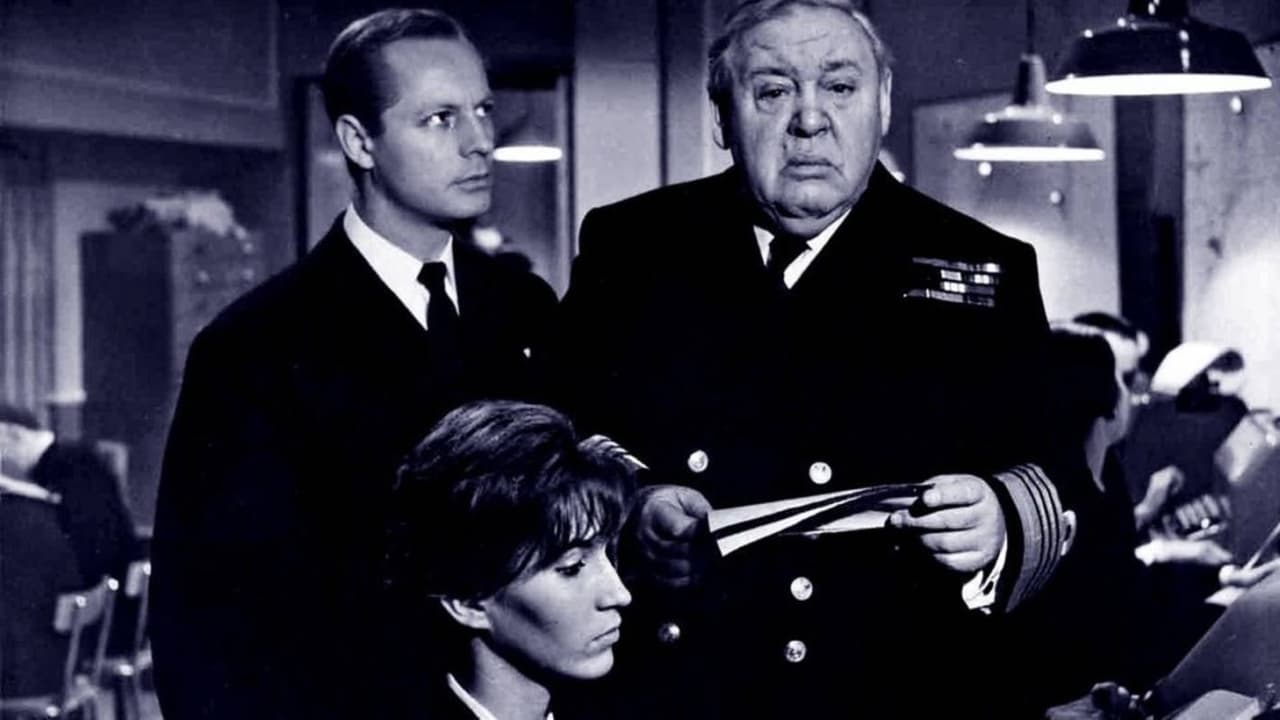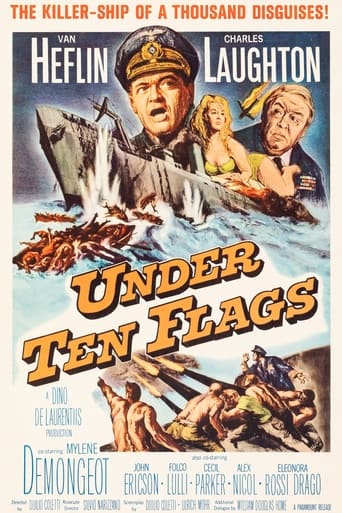SmugKitZine
Tied for the best movie I have ever seen
Smartorhypo
Highly Overrated But Still Good
Taraparain
Tells a fascinating and unsettling true story, and does so well, without pretending to have all the answers.
Fulke
Great example of an old-fashioned, pure-at-heart escapist event movie that doesn't pretend to be anything that it's not and has boat loads of fun being its own ludicrous self.
Martha Wilcox
You can tell Charles Laughton was coming to the end of his career in this dull and uneventful film. They call it a movie but it's not. I don't know what it is: documented history, docu-drama. Whatever you want to label it, it is not a movie. I can see why it hasn't stood the test of time because there is nothing in it to feed Laughton fans. It comes nowhere near the quality of 'Hobson's Choice' or 'Full House'. In terms of being a battleship film, Laughton did something similar nearly twenty years earlier in 'Stand by for Action' with Robert Taylor. That was also a poorly made film and did not deserve to be called a movie.I would advise Laughton fans to stay away from this film because you miss nothing by not watching it.
MartinHafer
"Under Ten Flags" may not be the most exciting war film ever made. It lacks the scope or star power of films like "The Guns of Navarone" or "The Eagle Has Landed". However, it more than makes up for it because unlike most war films, it's historically accurate--at least in all the major details. As a retired history teacher, I really, really appreciate that--as too many films play fast and loose with the facts. In this case, it's interesting enough that it didn't need a lot of embellishment.The film is about a German ship that harassed British shipping in the Atlantic. It was able to do this so successfully because the ship appeared to be just another merchant ship. And, the title of the film is a comment about how the ship could quickly be changed to look like a boat from many different friendly nations. So, again and again, when British naval ships neared, the German craft changed appearances to make it seem quite innocuous. But, with torpedoes, guns and a crack crew, this was a very lethal ship. The problem for the British is that they needed to find it.As for the captain of this German ship (played by Van Heflin), he was an interesting fellow. He was, foremost, a professional and not a Nazi party man. This made for many interesting moments in the film, as he tried to fight cleanly--in a manner that minimized deaths--especially to civilians. The contrast of this and some of his blood-thirsty Nazi crew was profound...and real.Overall, a very interesting film because it was so unusual, thoughtful and well written. Well worth your time--especially if you want to see what WWII was really like.By the way, being the history buff, I notice little details too--such as the striking blonde who is dressed and coiffed circa 1960--not WWII.
bkoganbing
Under Ten Flags is a film about the destruction of the German surface raider Atlantis during the years of World War II before American entry. Based on a true story the captain is played by Van Heflin who is a master at camouflaging his ship as an ordinary merchant vessel and then springing a big surprise on Allied commerce. His ship carries at least ten flags for each occasion including the swastika rolled down when the moment is right to strike.Heflin seems to take his cues from the famous sea raider of World War I, Count Felix Von Luckner who operated exactly that way in the previous conflict. That's not easy to do the same during this war with Germany's new masters, still Heflin has a code he lives by. He's also got at least one confirmed Nazi in his crew, John Ericson a young Aryan true believer. He can't believe that Heflin actually treats the prisoners he takes like human beings including a Jewish husband and wife who gives birth to a baby daughter on the ship. Ericson vows to report such subversive behavior to the proper authorities in Berlin.This film is very similar to Sink The Bismarck and the guy trying to put Heflin and his raider out of business is Admiral Charles Laughton in London. It's all a matter of cracking the German code and the action also is in occupied Paris where they've got the code in the German embassy. Laughton wants to take Heflin down but he's absolutely enthralled by Heflin's skill and daring. Beyond that Laughton's part as the British admiral is rather ill defined. Usually I enjoy watching Laughton in anything and I like him here as well, but he's not given all that much to work with and the film clearly belongs to Heflin.Who delivers a very good performance as a civilized man trying to stay civilized in barbaric times and having barbaric people run his country. Under Ten Flags for some reason seems to have disappeared and I count myself lucky to have gotten a copy of the film to review it. I think fans of war films will consider themselves lucky to see Under Ten Flags.
ma-cortes
However incredible they may seem the events narrated in this picture actually occurred and starred by Bernhard Rogge (Van Heflin), captain of the German raider at that time called Atlantis . It deals with the sensational 665-Day chase of the Killer-Ship Atlantis captained by Bernhard Rogge pursued by the British staff commanded by Admiral Russell (Charles Laughton ) ; including an intrigue upon secret agent (Alex Nicol) robbing documents by means of a dangerous mission .This interesting war movie contains suspense , thrills, sea battles and historical events . It's an European co-production lavishly and mostly produced by the great Italian producer Dino De Laurentiis . Exceptional cast formed by European actors as Italian as Gian Maria Volonte , Eleonora Rossi Drago ,Folco Lulli , Corrado Pani , American as Van Heflin ,Alex Nicol ,Walter Barnes , French as Mylene Demongeot , British as Charles Laughton , Cecil Parker , Ralph Truman , and German as John Ericson ,Peter Carsten , Gerard Herter , Helmut Schmid , Diete Eppler . Very good musical score by the classic Nino Rota , with tunes similarly composed to the subsequent The Godfather . Atmospheric cinematography by Aldo Tonti , though is necessary a fine remastering and contains several stock-shots . The motion picture is well directed by Duilio Coletti .The picture is based upon events which actually occurred during a series of naval actions in 1940-41 and carried out by Bernhard Rogge (1899-1982) exceptionally played by Van Hefiln . Rogge was one of many German officers who were forced to apply for a German Blood Certificate, that would allow their racial background to be overlooked (he had a Jewish grandparent).He was awarded a Japanese ornate Samurai sword and the Oak Leaves to the Knight's Cross of the Iron Cross for his actions as the commander of the Hilfskreuzer (auxiliary cruiser) Atlantis . Rogge became a Vizeadmiral (vice-admiral) by the end of World War II, and eventually became a Konteradmiral (rear-admiral) of the West German Bundesmarine. Rogge also was one of the few German officers of flag rank who was not arrested by the Allies after the war. This was due to the way he had exercised his command of Atlantis.The skipper of the British vessel, City of Baghdad, which the Atlantis sunk in July 1941, stated, "His treatment of prisoners left respect, instead of hatred". Admiral Karl Dönitz, who was prosecuted for war crimes at the Nuremberg Trials, cited his own support of Rogge in an effort to clear himself of the charge of being antisemitic. Rogge was later a German officer for Nato in the territorial Allied Naval Forces .

